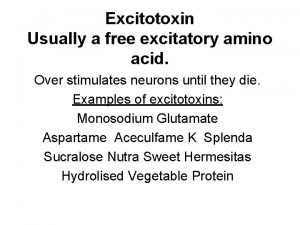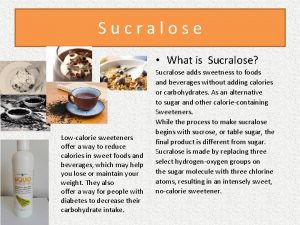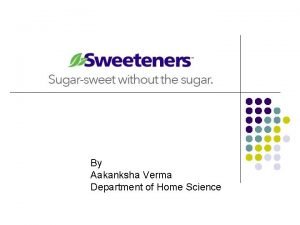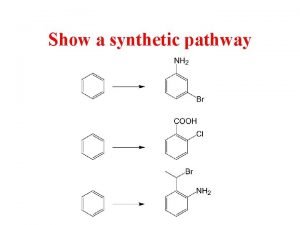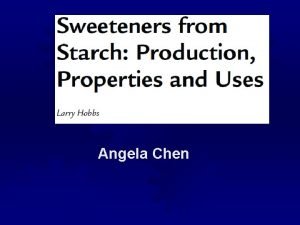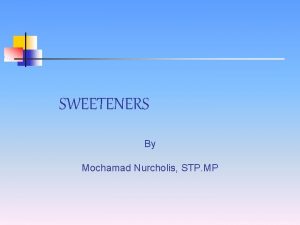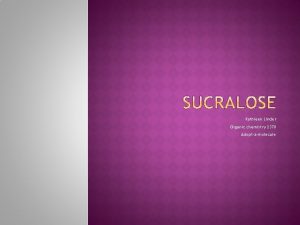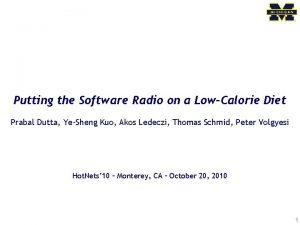Sucralose What is Sucralose Lowcalorie sweeteners offer a








- Slides: 8

Sucralose • What is Sucralose? Low-calorie sweeteners offer a way to reduce calories in sweet foods and beverages, which may help you lose or maintain your weight. They also offer a way for people with diabetes to decrease their carbohydrate intake. Sucralose adds sweetness to foods and beverages without adding calories or carbohydrates. As an alternative to sugar and other calorie-containing Sweeteners. While the process to make sucralose begins with sucrose, or table sugar, the final product is different from sugar. Sucralose is made by replacing three select hydrogen-oxygen groups on the sugar molecule with three chlorine atoms, resulting in an intensely sweet, no-calorie sweetener.

How is Sucralose absorb in the human body? Unlike sugar, the body does not break down sucralose into calories for energy. Both sugar and sucralose activate the same taste buds on your tongue. Most of the sucralose people consume is not absorbed and passes through the body. The little that is absorbed is excreted in the urine, and doesn’t accumulate in the body. “ “ Sucralose is not metabolized by the body for energy, and therefore it contains zero calories.

Can people who have diabetes consume foods and beverages Containing sucralose? YES Sucralose has no effect on blood glucose or insulin levels in people with diabetes, and therefore it is safe for them to consume. Foods and beverages sweetened with sucralose provide sweet options that are lower in carbohydrates. As with any nutritional concern, people who have diabetes should talk to a registered dietitian, health care provider and/or diabetes care professional for advice on incorporating foods and beverages containing sucralose into their diets.

Is there an association between artificial sweeteners and cancer? Questions about artificial sweeteners and cancer arose when early studies showed that cyclamate in combination with saccharin caused bladder cancer in laboratory animals. However, results from subsequent carcinogenicity studies (studies that examine whether a substance can cause cancer) of these sweeteners have not provided clear evidence of an association with cancer in humans. Similarly, studies of other FDA-approved sweeteners have not demonstrated clear evidence of an association with cancer in humans. • Before approving these sweeteners, the FDA reviewed more than 100 safety studies that were conducted on each sweetener, including studies to assess cancer risk. The results of these studies showed no evidence that these sweeteners cause cancer or pose any other threat to human health.

Sucralose’s Global Safety Recognition In the United States, the U. S. Food and Drug Administration (FDA) must approve all food additives before they can be used in foods and beverages. The FDA approved sucralose for certain food and beverage categories in 1998, and expanded the approval to all food and Beverage categories in 1999. Sucralose is approved for use in over 80 countries • • • • European Union Scientific Committee on Food (SCF) • U. S. Food and Drug Administration (FDA) • Food Standards Australia/ New Zealand (FSANZ) • Health Protection Branch of Health and Welfare Canada • (Food and Agriculture Organization/World Health Organization) Joint Expert Committee on Food Additives (JECFA) • Japan’s Ministry of Health and Welfare

Does sucralose cause tooth decay? No. Sucralose does not cause cavities. The bacteria in plaque do not break down or “eat” sucralose, and therefore the acids that can lead to cavities do not form. Sucralose does not increase the growth of bacteria in the mouth and does not promote tooth decay. Can pregnant and breastfeeding women consume sucralose? Yes. Anyone can consume sucralose, including pregnant and breastfeeding women. Research has shown that sucralose does not have harmful effects on pregnant women or their babies. Although sucralose may be consumed as part of a healthful pre- and post-natal diet, a pregnant or breastfeeding woman should talk to her physician or health care provider about consuming the necessary nutrients to support her and her baby’s health throughout pregnancy and infancy.

Is sucralose safe for children? Yes. There is no evidence that sucralose is at all harmful to children. In fact, sucralose can be part of the solution to the growing problem of childhood obesity by helping to reduce calories from sugar. Conclusion Scientists have conducted many studies on sucralose to determine whether it had any effects on a number of different health conditions, including growth an development, risk of cancer, chemical effects on the body (or toxicology), developmental abnormalities such as birth defects, and effects on the nervous system. Experts from a wide range of scientific backgrounds have reviewed these studies and concluded that there are no harmful effects from consuming sucralose, even in people consuming the highest amounts. The Acceptable Daily Intake (ADI) for sucralose, established by the Joint Food and Agricultural Organization/World Health Organization Expert Committee on Food Additives, is 0 to 15 mg/kg body weight/day. In the studies reviewed, even when exposure levels were several orders of magnitude greater than the recommended ADI, sucralose did not demonstrate carcinogenic activity.

References used : International Food Information Council Foundation FDA website Journal Reference: 1. Colin Berry, David Brusick, Samuel M. Cohen, Jerry F. Hardisty, V. Lee Grotz, Gary M. Williams. Sucralose Non-Carcinogenicity: A Review of the Scientific and Regulatory Rationale. Nutrition and Cancer, 2016; 1 DOI: 10. 1080/01635581. 2016. 1224366 • Pub med • https: //www. ncbi. nlm. nih. gov/pubmed/2862125 • “Int J Fertil. 1985; 30(1): 85 -7. • •
